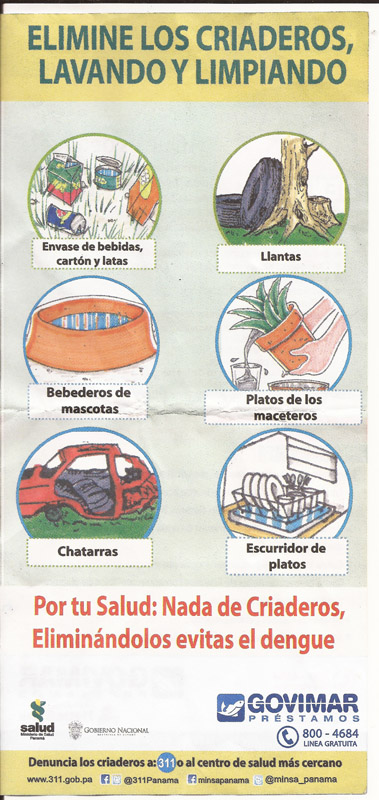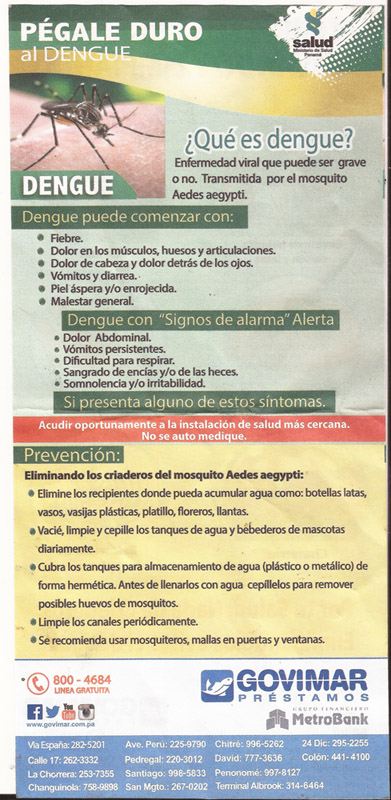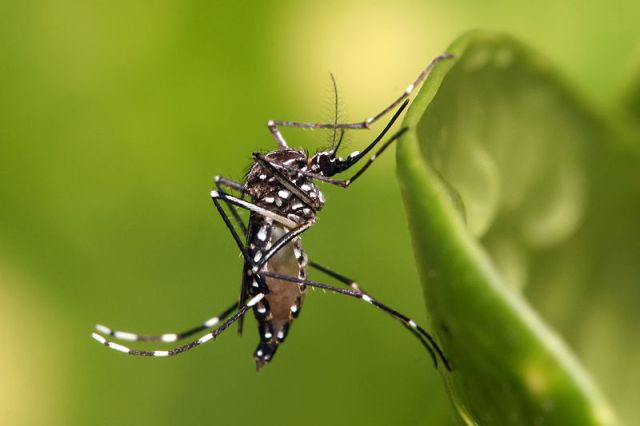A flyer fell out of a package of trash bags so I picked it up. I know that there is dengue fever in Panama, and that the authorities are working hard to prevent it and educate people on mosquito control. I have heard that they are even going house to house in some areas to check for standing water and to be sure people understand what they need to do.
What is dengue? A viral illness which can be serious or not. Transmitted by the mosquito Aedes aegypti.
Dengue can start with:
- fever
- pain en the muscles, bones, and joints
- headache and pain behind the eyes
- vomiting and diarrhea
- rough and/or red skin
- malaise
Dengue with warning signs
- abdominal pain
- persistent vomiting
- difficulty breathing
- bleeding gums and/or feces
- drowsiness and/or irritability
If you have any of these symptoms, get help quickly at the nearest health facility. Do not self medicate.
Prevention:
Eliminate the hatcheries of the mosquito Aedes aegypti:
- Eliminate containers where water can accumulate like: bottles, cans, cups, bowls, plastics, saucers, vases, tires
- Empty, clean and brush the water tanks and drinks of pets daily
- Cover the water storage tanks (plastic or metal) so they are airtight. Before filling them with water, brush to remove possible eggs of mosquitoes.
- Clean the channels (canals?) periodically
- It is recommended to use nets, mesh in doors and windows
 ELIMINATE THE BREEDING SITES,
ELIMINATE THE BREEDING SITES,
WASHING AND CLEANING
Beverage packaging, cartons, and cans.
Tires
Pet drinks
Dishes of planters
Scrap
Dish rack
For your Health: No breeding areas, Eliminate them to avoid the dengue
I seem to be on a dangerous bug thing this week. This is important though. I don’t believe there is much dengue in our area, but I know it is a concern in most tropical areas worldwide. I have also heard that if you get it a second time, it can be much more serious. It is even recommended that if an expat gets it, they return to the US or wherever they are from to avoid a second exposure. For me, I think this would be even worse than getting sick.
This is a Wikipedia photo of the aedes aegypti, the mosquito that can carry dengue (and also some other diseases). They are easy to spot because of the white bands on their legs. We see very few mosquitoes here, thankfully, but I have seen these occasionally.
May we all stay healthy!
We are headed to Puerto Jimenez, Costa Rica for the weekend. I promise, no more bugs! Well, not unless I see something really interesting and pretty 😀









My brother got this in Fiji. Nothing to mess with. Use your deet!
LikeLike
Yes, that’s what I hear. Others have also said they were terribly sick with it.
LikeLike
Ron, our son Cory, and I all had Dengue Fever. No wonder they call it break back fever. The worst was the pain behind my eyes. They felt as if they were going to burst out of my head. We couldn’t do anything for weeks. It’s kind of scary thinking about getting it again because it will be the hemorrhaging type. YIKES! Keeping our fingers crossed.
LikeLike
Oh no, so sorry you had to go through that 😦 Yes, be very careful!
LikeLike
I got it when I was in the Rio Dulce of Guatemala back in ’92. Pain? My eyelashes hurt! I have no idea what my fever was as I lay on my bunk in my boat at anchor, in and out of sensibility. At that time there was also a cholera epidemic in the area, so, like all the cruisers I’d stocked up on re-hydration salts (dehydration is how cholera kills you) and during my lucid moments I’d drink as much of the stuff as I could before lapsing into semi-consciousness again. The worst of it lasted almost three days. When it was over I’d lost so much weight that I literally had to tie my pants on since my belt wouldn’t cinch up tight enough.
LikeLike
That sounds like an especially awful weight loss method, especially for someone who doesn’t have weight to lose. Are you afraid of getting it again here? It seems if you were that terribly sick before, a repeat would be a very bad thing.
LikeLike
There are some things that just aren’t worth worrying about. Getting dengue again isn’t something I care to worry about. Getting the flu scares me a lot more when the tourists descend in the winter from the flu-ridden U.S.A.
LikeLike
Yet another reason to stay out of the tourist destinations.
LikeLike
I think they had a few cases in Florida last year. Sounds absolutely dreadful but hopefully increased awareness cuts down the breeding sites!
LikeLike
I never heard about it in Florida, but they definitely have mosquitoes there. Yes, I hope the efforts keep things under control!
LikeLike
The second time around is when you are likely to get hemhorragic dengue. Internal bleeding of organs much like ebola. It is nothing to take a chance with and is frequently fatal. Going back to the states would definitely be the better option, although thee is dengue in some areas there now, also.
LikeLike
That’s what I read, and that the fatality rates go way up with the hemorrhagic dengue. I hope I’m never in the position of having to make that kind of decision.
LikeLike
Do not get nervous. On our island St. Lucia it is quite common. I had it 5 years ago for about 5 days. Helen had it twice. The last time joint pain was quite bad for 7 days, but she was tired for 5 weeks, Drink a lot of water! There are 4 types of dengue. Once you had type one you are immune for life for type one. Helen has two more to go! There is no medicine. But mostly infants could die. On our small island the authorities are spraying regularly in some urban aereas. I personally had twice malaria when I lived in Nigeria and that is worse. In some areas in Panama
you have yellow fever and that can be often deadly, but you can get vaccinated against it and that will be valid for 10 years. Do not worry too much about dengue.
LikeLike
I don’t tend to get too nervous about anything, just aware. I know people get quite sick with this illness, and I have other things to do beside be sick! I am in good health so I think it would probably just land me on the couch for longer than I want to spend there. Malaria sounds awful because it sounds like it can hang on forever and keep resurfacing over and over. No vaccines are required for Panama and I haven’t heard about yellow fever. Nothing is without risks of one sort or another, and this is an acceptable risk for us.
LikeLike
Wow very informative. At least Panama is trying to help its people. i didn’t know the second time was hemorrhagic. We actually saw way less mosquitos in Panama than we have in Wisconsin but it was the dry season. Do you happen to know what the mosquitos are like in Anton? That’s an are we are going to check out on our next visit or after we move.
LikeLike
I think the second time is much more likely to be hemorrhagic, but it is possible the first time, and possible that it won’t be the second time as well. I forget what the Wikipedia article said, maybe 5% the first time, and 25% the second time around?
LikeLike
Guess my typing isn’t so great on the ipad LOL! I meant El Valle de Anton to clarify.
LikeLike
I figure that’s what you mean and I don’t know about the mosquito situation there. In general though wherever we have gone in Panama we have seen no or very few mosquitoes.
LikeLike
I had three mosquito bites when we were there and I think I got them in PC because I didn’t notice them until right before we left. Mosquitos in Wisconsin are so thick that if you don’t have DEET on at dusk you will literally be swarmed. And they seem to be attracted to some people more than others and I’m one of the unfortunate ones who they love. I’ve read it’s my CO2 they love. It’s like crack for mosquitos!
LikeLike
Oh yes I know. Florida, Kansas, anywhere else I’ve lived it’s like that. You are driven inside quite quickly at dusk. It’s wonderful to enjoy the outdoors in the evenings, and though the risk of dengue is there I think it is quite small.
LikeLike
Ola from the cold and rainy Midwest; thank you for the Spanish translation; it became a great Spanish lesson. Take care.
LikeLike
My pleasure 🙂 Spring better be coming sometime for you! Enough with the cold already
LikeLike
Thanks Kris
Great information and comments.
LikeLike
My pleasure 🙂
LikeLike
I think it was more of a problem in January/February right after Wet Season. First they were talking about cancelling Carnaval because of Dengue and then it was the Hanta Virus but of course it went ahead. I think there’s only been one year it’s been cancelled due to an “outbreak” of something or other.
I think I wrote about the outbreak we were having here when it was going full bore. The Salud people were going door to door. Incredibly they were finding mosquitoes breeding in standing water inside peoples homes. That one was a head scratcher.
Hopefully they will keep up the prevention program going instead of waiting for another outbreak. Great article Kris.
LikeLike
I remember you talking about that and it sounded good that they were trying to keep things under control. Cancel carnival though?? Could they do that? That is such a big event it seems they would have some sort of revolt on their hands!
LikeLike
They threatened to but of course they didn’t go ahead with it. There was a ban on public camping though.
LikeLike
I’m sure there is a lot of money associated with carnival too. Have you heard about cases in your area, or are they just being careful?
LikeLike
We’ve had several cases, a few among the extranjeros. There’s probably a lot more that have gone unreported.
LikeLike
Ahh, bummer. I haven’t heard of anyone around here, and no talk among the expats either, not that I’m up on everything that goes on though, for sure. I’ve heard it happens that people think they just have the flu or something and don’t realize it’s dengue which doesn’t help with reporting either.
LikeLike
Aedes aegypti are known for their extremely long tail legs that characteristically stick in the air, which is much easier to detect than the white bands. The Culex genus of mosquito is the West Nile type and does not have highly-placed tail legs, but is known for all-day biting (not just dusk). The Anopheles genus of mosquito is the famed malaria mosquito. While the males all feed on nectar and plant sap, the females of each genus need blood to nurture their eggs. They prefer the blood of reptiles, but can be attracted to carbon dioxide and especially estrogen of warm-blooded sources. The CDC recommends 20-30% DEET (no more is needed), and recently recommended products containing picaridin (“Cutter”, “Fisherman’s Formula”), garlic, and vitamin B may have lots of advertisement as repellents, but there’s no research to support their use.
LikeLike
Wow, thanks for all the info on the various mosquitoes. They prefer reptiles? Then I will encourage all the lizards to live in our yard. I do keep insect repellent handy though, and it seems to help a lot with any flying bug that thinks I’m interesting. I had a strange experience in Puerto Jimenez, CR recently while eating breakfast at the hostel. This little wasp was determined to be on my feet, preferably between my toes. I took off my sandal and it went there for awhile, but then it was back on my toes. I finally gave my feet a squirt of bug repellent and that did the trick. I know, nothing to do with mosquitoes but the mention of DEET brought it to mind.
LikeLike
Just saw this…Dengue epidemic downgraded: http://www.newsroompanama.com/panama/7650-dengue-epidemic-downgraded-to-health-alert.html
LikeLike
Ahh, that’s good! Thanks for the update. It’s still good to be careful about standing water though. I don’t like to get bitten even if it’s just a bite and not something worse.
LikeLike
Thanks for the webpage! It also alerts us to the ongoing CHIKV (Chikungunya) virus that is the “me-too” milder-type virus to Dengue with fever for 2-5 days and joint pain that can last for months or even years also due to the mosquito Aedes aegypti.
Incidentally, to resolve the “mystery” of the Dengue Fever versus Hemorrhagic Fever and Shock Syndrome, we are not necessarily guaranteed to get “only” Dengue (break bone) Fever with our first go-around. And, escaping to the USA is no longer the haven it once was since it is now present throughout the southeast sunbelt to Texas and Arizona and soon indigenous there… thanks to all the tourist-traveling. The key is that Dengue is actually one of four closely related dengue viruses (DENV-1, -2, -3, and -4). So, when we “get” Dengue we become immune to one of the four virus serotypes, but remain susceptible to the remaining three. Theoretically, one person can get Dengue four times and “only” have Dengue (break bone) Fever, should that person be “lucky” enough to draw that many strikes against them.
The moral of the story is preventive measures are better than fear. Colonel Gorgas made his claim to fame lowering mosquito levels and ultimately ridding Panama of Yellow Fever (permanently) with two simple tools… oil and screens. We already use screens on our windows and doors, but we fail to squirt a little oil daily in the many puddles of standing water all around us to kill the larvae. That’s all he did. It’s a thought.
LikeLike
Yes, now that you mention it I remember hearing how they put oil on the water. That’s something to keep in mind for any standing water you can’t get rid of. Thanks for all the good information! I’m not especially afraid in our area but it’s a good thing to be aware and sensible. No one wants to be sick.
LikeLike